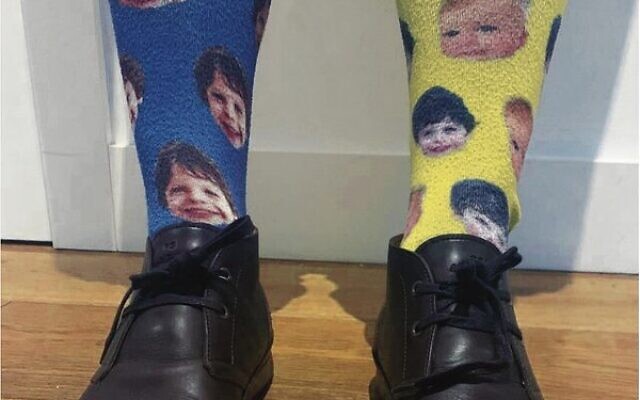Grof’s in socks for docs
"Pre-pandemic, levels of stress across the sector were already significant. In a 'COVID-normal' world, they are unfathomable."
Jewish Care chief medical officer Dr Simon Grof proudly donned a pair of wacky socks to show his support for doctors and health care professionals as part of the Crazy Socks 4 Docs movement earlier this month.
Crazy Socks 4 Docs is in its sixth year and the movement was first created by cardiologist Dr Geoff Toogood to address the stigma associated with mental health issues within the healthcare sector. Crazy Socks 4 Docs works to normalise conversations about wellbeing, while creating a safe place to work and seek help if needed.
Grof told The AJN that the COVID-19 pandemic “continues to take its toll” on healthcare workers, with the impacts further exacerbated by a bumper influenza season, and many “residential aged care facilities – and our healthcare system more broadly – are feeling the strain.”
Grof explained that though the pandemic has not been easy on anyone, it is the frontline workers in particular – the medical practitioners, health care workers and aged care staff “who continue to carry the heavy burden and emotional impacts of this public health crisis.”
“Pre-pandemic, levels of stress across the sector were already significant. In a ‘COVID-normal’ world, they are unfathomable. The daily stressors and challenges of the work have grown significantly.”
He also addressed the “physical burden” on frontline workers, with “long hours, PPE, staff shortages, heavy and changing workloads” as well as the “emotional impacts … of time away from loved ones; supporting distressed elders, patients and families as they (and we) grapple with isolation, grief and loss; and of course, the ever-present risk of contracting COVID-19 ourselves.
“Within the sector we have long known that the mental health toll for ourselves and our colleagues, including the disproportionate impact of suicide, is significant,” Grof said.
He expressed that “change is undoubtedly needed,” and explained that one of the best ways to improve mental wellbeing for frontline workers and healthcare professionals, “would be to address the structural inequities in how they are reimbursed and supported by government”.
“However, the culture within which we work is also important – and here we all have a role to play in creating awareness and supporting change.”


comments